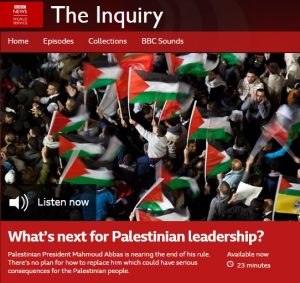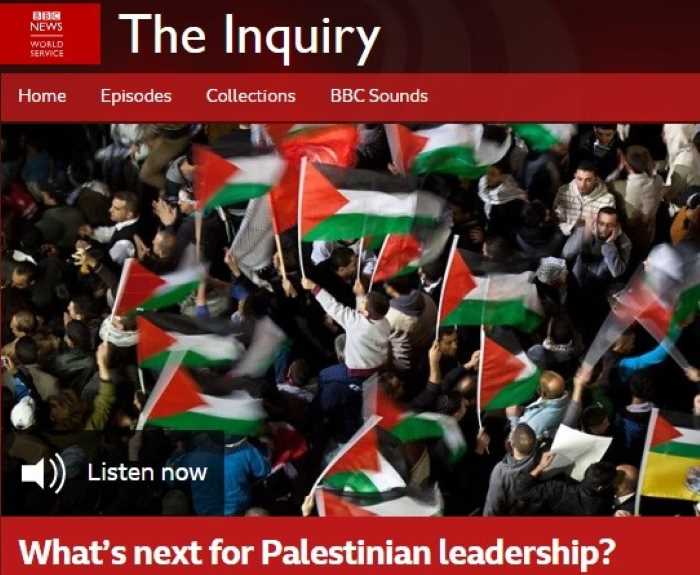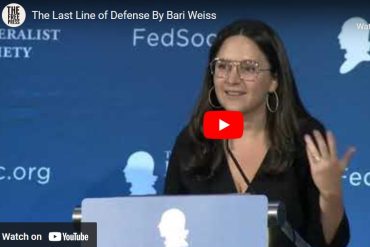The question of who will succeed the octogenarian Palestinian Authority president Mahmoud Abbas is one which has long been under discussion by regional analysts and commentators. However, the BBC’s serial under-reporting of internal Palestinian affairs means that audiences have to date been given little insight into that topic.
On September 14th the BBC World Service radio programme ‘The Inquiry’ aired an edition titled ‘What’s next for Palestinian leadership?’ which will remain available online for over a year.
“The Palestinian President Mahmoud Abbas is ageing and his ruling Fatah party is deeply unpopular. There have been protests against him and the Palestinian Authority. Many Palestinians feel the PA has lost legitimacy.
There’s no plan for how to choose a successor to Mahmoud Abbas and any candidate is likely to be controversial. There’s a risk that an unpopular replacement may throw the occupied territories into chaos, even violence, and have major implications for the future goals of Palestinian people.”
In her introduction, presenter Emily Wither (who is based in Istanbul) described the programme as presenting “one question, four expert witnesses and an answer”. However, as is all too often the case in BBC content relating to Palestinian affairs, listeners rapidly discover that a significant proportion of the programme’s portrayal of the declared topic of internal Palestinian politics is devoted to Israel.
Wither’s introduction begins thus: [emphasis in italics in the original, emphasis in bold added]
Wither: “This year has been the deadliest on record for Palestinians in the occupied West Bank. In July Israeli forces carried out their largest scale military operation there in decades, focused on Jenin. Israel says the city was being used to launch attacks on their citizens. Palestinians say they’re defending their land against increasing expansion of Israeli settlements – illegal under international law.”
BBC audiences around the world are not informed that the overwhelming majority of the Palestinians killed so far this year were terrorists or males engaged in terror attacks or violent rioting at the time rather than just random “Palestinians”. Neither are they told in the BBC’s own words that Jenin is a hub of terrorist activity from which around fifty attacks had been launched as well as a hiding place for wanted terrorists. Wither does not bother to clarify that there are no “Israeli settlements” in Area A where Jenin is located before continuing with yet more portrayal of armed terrorists as mere “Palestinians”:
Wither: “Dressed in black, guns raised in the air, Palestinians in the city have been protesting the violent crackdown. But their chants are not just directed towards Israel. ‘Fight the PA before the Israelis’ they shout. ‘Very useless authority’. That’s the Palestinian Authority: the governing body set up 30 years ago under the Oslo peace accords. They chant about a deeply unpopular leader; Mahmoud Abbas – also known as Abu Mazen. The 87-year-old has a history of health problems but it remains unclear who will succeed him. A failed transition could plunge the occupied West Bank into chaos. That’s why this week on ‘The Inquiry’ we are asking what’s next for Palestinian leadership?”
The first of the programme’s four parts is presented with the title “fury and frustration” and listeners hear from “witness” Dalia Hatuqa who is introduced as an “independent Palestinian journalist”. Wither begins by describing the 1993 Oslo Accords as:
Wither: “A peace deal supposed to pave the way to the creation of a Palestinian state. It created the Palestinian Authority to govern the West Bank and Gaza Strip for five years while a permanent deal was negotiated. Those talks collapsed…”
As we all too often have cause to note when the BBC has promoted similar claims, the Oslo Accords in fact make no mention of the two-state solution or a Palestinian state and they give the Palestinian Authority control over specific designated areas populated by Palestinians rather than “the West Bank” in its entirety as erroneously claimed by Wither. Notably, her portrayal fails to mention Palestinian terrorism against Israelis in the years immediately following the signing of the Oslo Accords or during the second Intifada and listeners are not provided with any explanation of the related issue of why “those talks collapsed” before she continues:
Wither: “…but the Palestinian Authority still exists and with it, a controversial arrangement that is shared security coordination with Israel. Israel depends on the PA security forces to prevent attacks on Israelis within the occupied West Bank and Israel.”
Listeners are not informed that the Palestinian Authority obligation to combat terrorism and violence is part of the Oslo Accords signed by the PLO before Hatuqa tells listeners that:
Hatuqa: “So it ensures that people who are basically against Israel in some sort of form are being kept away from, let’s say, military installations or settlements or checkpoints, even before anything happens.”
Wither and Hatuqa go on to amplify the claim that “the PA is doing Israel’s bidding and not protecting them”, using what is described as a “huge invasion of Jenin refugee camp” in early July as an example but without making it clear to listeners that members of the PA security forces have also been involved in terrorism.
They note that “Abbas’ long reign has come to resemble any other regional autocrat determined to cling to power” and his crack downs on political rivals and dissenting voices before continuing:
Wither: “Dalia says life now is very difficult for young people, with high unemployment and little hope.”
Hatuqa: “When you talk to young people they tell you we have a crisis in leadership. […] There is no national project, no vision, no direction and so for many of these people, the only solution is to take up arms and that’s why you’re seeing these small militias coming out, especially in refugee camps and, you know, once people have lost hope, they start to do hopeless things.”
Readers may recall that the same narrative – which whitewashes the part played by existing terrorist organisations in the establishment of such “militias” – has been promoted by the BBC in the past, including in cross-platform reports in June of this year:
BBC AGAIN VISITS TERRORISTS IN JENIN, PROMOTES ONE-STATERS – PART ONE
BBC AGAIN VISITS TERRORISTS IN JENIN, PROMOTES ONE-STATERS – PART TWO
The title of part two of the programme is “a power vacuum” and the “witness” interviewed is pollster Khalil Shikaki of the Palestinian Centre for Policy and Survey Research who tells audiences that 60% of Palestinians believe that the PA today is “a burden on the Palestinian people” and only 15% think Abbas should stay in office.
Wither goes on to present a tepid account of the 2007 Hamas coup in the Gaza Strip and again misleads listeners on the topic of the territory under PA control:
Wither: “Then there’s the rift between Abbas’ party Fatah and Hamas. In 2006 the Islamist militant group won legislative elections. Hamas is seen as a terror organisation by the UK, America and the EU. Their win led to sanctions being imposed on the Palestinians and the suspension of foreign aid. After fierce clashes in Gaza, Abbas dissolved the government. Since then his Fatah party has ruled the West Bank and Hamas has led Gaza.”
In contrast to Hatuqa’s narrative of frustrated youth taking up arms, Shikaki gives a more realistic portrayal of the situation:
Shikaki: “Hamas is already destabilising conditions in the West Bank. These conditions in the West Bank today show that the Palestinian Authority is weak so Hamas wants to take advantage of all of that and the formation of armed groups is in part something that Hamas is trying to do to create a military infrastructure in the West Bank that would be able to challenge the Israelis today but also be able to challenge the Palestinian Authority if it tries to disarm or arrest them, these armed groups. So Hamas is working on both fronts: politically – by mobilising the public against the Palestinian Authority – and through force using armed groups and violence…”
With no mention of the relevant topic of what happened to the ‘peace process’ and Palestinian quality of life and aspirations after Hamas’ coup in the Gaza Strip, Wither goes on to state that “if Abbas was to resign or die”, the speaker of the parliament is supposed to become the provisional president pending elections and that the speaker of the parliament is from Hamas. Shikaki explains that the parliament was dissolved in late 2018 by Abbas and so there is currently no speaker. He cites a “vacuum” regarding potential successors and the possibility of civil war if “armed groups are to take matters into their own hands”.
The second half of this programme will be discussed in part two of this post.
Related Articles:
BBC’S KNELL OMITS BACK STORIES IN PORTRAYAL OF PA SUCCESSION
BBC NEWS IGNORES THE STORY OF THE NEW FATAH VICE-CHAIR
BBC NEWS SILENT ON PA POLITICAL UPHEAVAL
BBC’S KNELL GIVES A NARRATIVE DRIVEN PORTRAYAL OF THE OSLO ACCORDS





